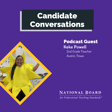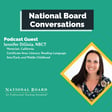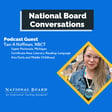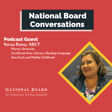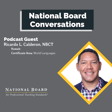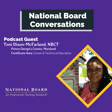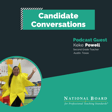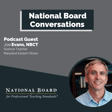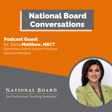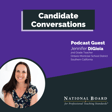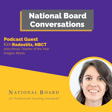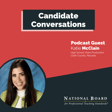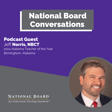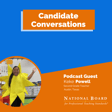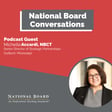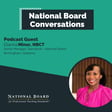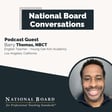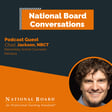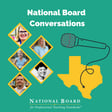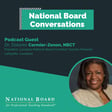Become a Creator today!Start creating today - Share your story with the world!
Start for free
00:00:00
00:00:01

Michele Morgan
Michel Morgan is a National Board Certified Teacher in Salt Lake City, Utah. Recently in The Standard, Michele discussed the impact of monitoring your crisis cycle. On this episode of National Board Conversations she talks you through the stages of the crisis cycle, and help identify some tactics to help keep you from falling into crisis.
Be sure to follow us on all our social media platforms to keep up with all National Board related updates.
Twitter: @NBPTS
Instagram: @NBPTS
Facebook: The National Board for Professional Teaching Standards
Transcript
Introduction of Michelle Morgan
00:00:00
Speaker
Welcome back to National Board Conversations and on this episode we head out to Utah to chat with Michelle Morgan. She's a National Board Certified Teacher and an Elementary Special Education Coordinator for the Granite School District.
Understanding the Crisis Cycle
00:00:11
Speaker
On this episode we go over the crisis cycle and how to identify it in ourselves and steps to take to keep us from being too overwhelmed. It was an informative conversation so here's Michelle Morgan. Welcome Michelle, how's it going today?
00:00:24
Speaker
I'm great. How are you doing? All right. You know, it's DC cold this winter time. So we're trying to power through this winter, but we'll get started. It's cold in Utah too. I can imagine. Yeah. You're calling from up in the mountains. It's a little bit different kind of cold. Yes. I agree. Yep. So I mean, you gave us a quick little intro. Can you continue that?
Career Journey: From Advertising to Education
00:00:45
Speaker
What's your current role? Where are you calling from?
00:00:47
Speaker
So originally I grew up in Southeastern Virginia, like in the Hampton Roads area. And then I graduated in the 90s and got my undergraduate degree in advertising. And I worked in advertising for about 10 years and I really did not like it very much. So I took a couple of years off, started to have a family,
00:01:16
Speaker
And decided that I needed to go back to work and I wasn't sure what I wanted to do. And my mom had been a high school English teacher. And so she said well why don't you go look into teaching that might be something that you would really like.
00:01:31
Speaker
And I remember that my mom used to grade papers nonstop. She would be cooking and grading papers. She would be watching TV, and she'd be grading papers. And so when she mentioned that, I thought, I don't want to be a teacher. But she said, look into special education. That really seems like that would suit you. So I was in the DC area at that time, so I started
00:01:58
Speaker
in a program at George Mason University, which is where I got my master's in special education and worked in Prince William County for a couple of years and then moved out here to Granite School District. And for many years worked with elementary age children in the resource program.
00:02:19
Speaker
And in the last five years, I've been working for Granite School District in the special education department. And my current role is that I go out and I train first year special education teachers. Wow. Well, you're doing really good work. You had quite an adventure, an excellent teacher, and it's all due to your mom. Well, thanks, Ma. Exactly. Yeah, she's pretty great.
00:02:42
Speaker
So why did you end up pursuing more certification?
The Pursuit of National Board Certification
00:02:46
Speaker
Well, I got my certification in 2013 and so at that point I had been teaching for probably about eight years and I think I was in a slump at the time. I felt like I wasn't really.
00:03:01
Speaker
learning anything new that particular year, I just felt like my progress, I kind of stopped. And I kept on seeing things on Facebook about national board certification. And nobody had ever mentioned it to me. I didn't know what it was. And so I started to look into it. It sounded interesting. I like to take on new projects and I like to mix things up every couple of years. So I thought this might be a new challenge.
00:03:26
Speaker
That could get me re engaged. And so, went through the process and really, I really enjoyed the reflective piece of becoming national board certified because it made me think more about what I was doing.
00:03:44
Speaker
and maybe analyze what was working and what was not working in my classroom. And it helped me to feel more confident about my teaching decisions. And so I feel like it was a great thing for me to pursue. I'm grateful for it every day. So what did you learn about yourself going through the process? Well, the first thing I learned was that I do
00:04:11
Speaker
I know a lot of stuff. I'm a pretty good teacher is what I found out. But if you would have asked me to stop in the middle of a lesson and explain why are you using that strategy? Or why are you doing this with this student? It was hard for me.
00:04:30
Speaker
to really articulate why I was making the decisions that I was, because I was usually running around so much. I was always on the move. There was always another student to teach or a behavior that I needed to help a student work through. So I just never really stopped to analyze why I was doing what I was doing. So I think it helped me to realize that I need to be able to stop and really
00:05:00
Speaker
be willing to make changes on a day-to-day basis about what I'm doing. So I've just become more reflective and it just made me realize that I just needed to stop and think for a few more minutes about what I was doing to make sure I was on the right track. And now you're a National Board Certified Teacher. We love it. Yep, I love it. So you recently wrote a blog for us titled One Step Away From Crisis, you know, gets into the crisis cycle.
Crisis Cycle and Its Relevance in Education
00:05:25
Speaker
Can you give a brief description of what the crisis cycle is?
00:05:29
Speaker
Sure. The crisis cycle is a pattern of behaviors that people go through when they are going into an emotional crisis or a traumatic event. And we use the crisis cycle a lot when we're trying to understand the behavior of our students.
00:05:47
Speaker
And I have recently started to think about how it applies to teachers, in addition to students. So basically, we are usually at a baseline base, and that's when we're feeling good, and we just need to keep doing what we're doing. That's where we want to be.
00:06:07
Speaker
But usually something will change in our environment and that it will be a stimulus or a trigger for us. And usually it causes us to have some kind of uncomfortable reaction to what's changed. And if we're good at understanding the crisis cycle, we can identify what's changed in our environment and then we try to get away from that trigger.
00:06:35
Speaker
But if we ignore it or if we're not, you know, we're so busy, we're not really aware that something has changed in our environment, we could continue up into the next phase, which is escalation. So during escalation, we may start to exhibit some problematic behavior, whether you are a student or an adult. You know, I mean, adults go through the crisis cycle as well.
00:07:01
Speaker
If we're able to realize that we're escalated, it's a good idea for us to kind of take a step back for a minute and remind ourselves that there are lots of options that we have for solving the problem. And so we don't just have to fly off the handle. Sometimes though, we are just so stressed out or so deep into the cycle that we just continue kind of moving up that mountain and we hit crisis.
00:07:30
Speaker
So crisis is we're full on meltdown, right? And for a student that might look like I'm acting out, I'm getting physically aggressive or maybe I'm destroying property. But for an adult that looks different because we handle our stress levels differently. So we're not necessarily acting out.
00:07:55
Speaker
But we, you know, we all have a crisis level that point we're not thinking very clearly. We're not able to communicate very clearly. And so we need to just kind of isolate ourselves and just try to, you know, put ourselves kind of in a in a spot where we can just take a step back. And then when you.
00:08:14
Speaker
It takes a lot of energy to go through the crisis cycle. So you've hit that crisis, and then there's a couple of stages that you go through when you are trying to calm down. So you would go into a de-escalation. De-escalation is probably one of the most critical phases in the crisis cycle because it's really, really easy for something else to set us off at that moment and just take us right back up to crisis level. If we don't give ourselves enough time to cool off,
00:08:45
Speaker
So we really just need to be taking a break and just doing something easy at that point just to kind of relax our minds. And hopefully, you know, we get through de-escalation and we enter stabilization. And stabilization is kind of when we start to reflect on our behavior. We kind of start to feel a little bit guilty maybe about how we reacted to the crisis. We start to feel
00:09:11
Speaker
Like maybe we could have done a better job controlling our emotions. And then finally, we can go into post crisis. Usually we're just really tired. We just feel like we need to go home. We need to take a nap. We need to rest. So that's kind of the crisis cycle in just a few minutes.
00:09:34
Speaker
Hey, so you mentioned earlier that you help teachers. What lessons did you learn while helping teachers handle the crisis cycle and things like that during the pandemic?
Pandemic Stress and Personal Crisis Cycles
00:09:45
Speaker
Well, so we're all very stressed right now. This is just a hard time to be teaching with the pandemic.
00:09:55
Speaker
There's a lot of stress that teachers deal with on a day-to-day basis just without even taking into account the pandemic.
00:10:04
Speaker
We're dealing with being worried about the progress that our students are making. We're worried about making sure that we're attending to all of our job responsibilities and we're learning new curriculum programs. And so there's a lot of pressure on teachers to maintain all of their job responsibilities. And then the pandemic came along and it's just really, really made things a lot more difficult. And I feel like
00:10:34
Speaker
We are all kind of just trying to survive, day by day, and we're a lot of us are in the escalation phase of the crisis cycle and we don't even realize it.
00:10:49
Speaker
I've been trying to help my teachers recognize that they have an individual crisis cycle that is unique to them. And if they can identify it, if they can figure out where they are, then they can choose a strategy that can help them to avoid going all the way into crisis mode.
00:11:10
Speaker
And that's really what we want to do with our students as well. We want to avoid crisis. So key is awareness. So yeah, that's what I've learned is that sometimes we're so busy that we don't even have a chance to think about where we are mentally. We're so worried about taking care of everyone else.
00:11:31
Speaker
that usually we are low on on the priority list and then we end up in crisis because we don't even realize that we are as stressed out as we really are. So do you have any exercises that for people to sell for teachers to self-diagnose where they are in their crisis cycle?
00:11:50
Speaker
Well, I like to map out the crisis cycle for my teachers. So I actually have a form that I use. It's basically, it has a picture of the crisis, the arc. You kind of are moving up the crisis cycle. I call it the crisis mountain. We go up and then we go down and we list all of the different phases. And then next to the phases, I like for teachers to think about what it looks like for them.
00:12:20
Speaker
What is baseline look like for you? And then we will write that down. What does it look like if you're triggered? What might the look on your face be? What is your body doing? What does it feel like inside? And we kind of go through and we will kind of describe that and write that down. Then we'll go back through and we will talk about what kind of strategy could we put in place if you're triggered? What can you do?
00:12:50
Speaker
I'll give you an example. I started this by doing my own crisis cycle and just kind of playing around with this idea before I started going out and talking with other teachers about this. In my crisis cycle, when I'm triggered, I will start to hide from my colleagues. So instead of maybe doing as much social interaction with the colleagues around the district office, I may hide in my cubicle.
00:13:21
Speaker
And then if I don't catch on to the fact that I'm triggered, I may escalate and I may stop answering emails in a timely fashion. Or maybe I don't respond to text that I'm receiving. Or I might even find a reason to cancel an appointment so that I don't have to
00:13:40
Speaker
to interact and deal with the stresses. So what I had to do was I realized that when I'm getting escalated, a strategy that I can use is I can try and I make a priority list
00:13:57
Speaker
I try and pick maybe two or three things that absolutely have to get done that day. I try to go out to lunch that day in order to talk with a friend and I try to work on things that maybe don't require me to be quite as socially active. So maybe I'm doing paperwork or maybe I'm working on a presentation or some sort of professional development that I'm going to give to my teachers.
00:14:22
Speaker
So being aware of where I am in that crisis cycle, then I can look at my crisis cycle chart that I made and I can say, oh, this is the strategy that I need to use today to help me to de-escalate so that I can get back to baseline. And it works for my teachers too. Awesome. Thank you. We'll link to your article in the show notes. And if you have any resources, be sure to send them my way and I can link to those as well for people, for teachers who are listening to this.
Personal Insights and Fun Facts
00:14:51
Speaker
And so now we're going to get a little bit more personal, get to know you on like a little bit of a personal level. Here we go. So, um, first question I got, I got three questions for you to know, can let know a little bit about you. Uh, first one was who was one of your celebrity crushes growing up? Keanu Reeves. Keanu Reeves. I saw him in speed. I don't know. There are a lot of younger people that probably have not seen that movie. I saw him in that movie and I fell head over Hills in love with him. So yeah, Keanu Reeves.
00:15:19
Speaker
What was your first job growing up? I did filing for the State Farm Insurance Office in my neighborhood. I was 15. My mom had decided I needed a job because I was driving her crazy. So she drove me around and she was making me fill out applications for Taco Bell and Burger King and McDonald's.
00:15:43
Speaker
And I wasn't getting an interview. And then she had this crazy idea that, well, maybe they need somebody to file things. So she drove me over to the State Farm office in our neighborhood, and she made me get out of the car. And she said, just go ask them if I need help. I felt so stupid. I was like, they don't need help. I'm 15. They're not going to hire me. But they did. They hired me to file an hour and a half after school every day. So I was able to walk to the office
00:16:11
Speaker
You know, nowadays everything is digital, but we don't, I don't even think they have that job anymore, but it was a great little job. Sounds amazing. It sounds like something my mom would do. She would tell us, just walk up, ask the manager for an application. I'm like, nobody does this. I'm right there with you. I understand. Last one. What is at the top of your bucket list currently?
00:16:33
Speaker
Um, I want to go to Hawaii. I've never been there. Nice. National teacher, uh, 2022 national teacher of the national teacher of the year. Finalist is from Hawaii and she's an NBCT. So maybe you guys can get together. That would be awesome. I think that would be great.
00:16:50
Speaker
That's awesome. Well, thank you, Michelle, for taking the time. This was a lot of fun. I feel like I learned a lot and I've got to do my own stuff first. Well, thank you for having me. I appreciate the opportunity. I'll learn more and more with every episode.
Conclusion and Social Media Encouragement
00:17:04
Speaker
What a helpful episode and great tip from Michelle to help us deal with our own crisis cycle.
00:17:09
Speaker
Thank you again to Michelle for taking the time to chat with me and thank you for taking the time to listen to National Board conversation. Be sure to follow us all across our social media to stay up to date with everything National Board related and we'll see you next time.
